Evolution and progression have become the new normal with upgrades and updates becoming a necessity rather than a luxury. The IT domain remains in continuous flux making it essential for creators to upgrade modern technology regularly. AXELOS introduced the futuristic newborn of ITIL – ITIL 4 in February of 2019, which has proved to be transformational for businesses with its state-of-the-art renovations and digitalized framework. The earlier versions of ITIL still hold tremendous value but the newest update better embraces the new-age technology. ITIL 4 introduces a lot of new concepts, terms, and ideas. It does not discard or disprove the concepts that were a part of ITIL V3 or any of the previous versions of ITIL.
This article concentrates on the difference between ITIL v3 and ITIL 4, of whether it’s a total rebuild from ITIL v3 in terms of approach, framework, and ideologies.
Changes in ITIL 4
-
ITIL v3 Processes vs. ITIL 4 Practices
The major shift from ITIL v3 to ITIL 4 is more of a terminology shift with changes focusing on business value rather than the technology itself. It is a move from processes to practices. ITIL v3 defined 26 processes which have been replaced in ITIL 4 by 34 management practices. ITIL 4 defines 34 management practices for co-creating value with customers and stakeholders. Holistically, the changes in ITIL 4 practices reflect a significant shift in the approach used by every organization for meeting their business needs.
Below is a breakdown of ITIL v3 processes and ITIL 4 practices.
ITIL v3 Processes
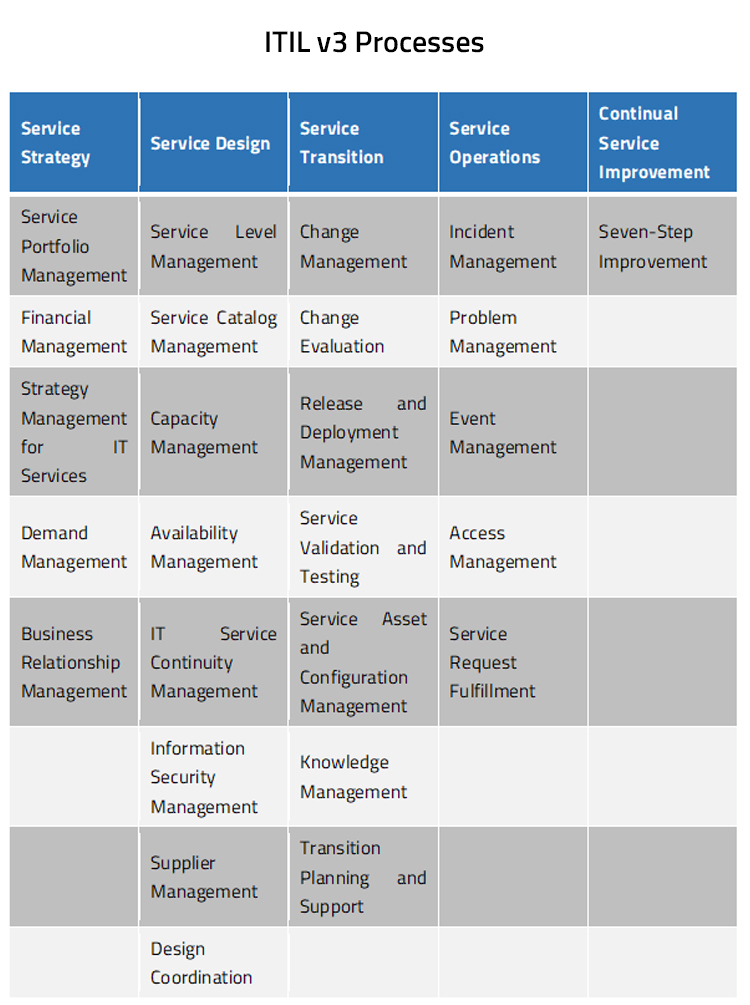
ITIL 4 Management Practices
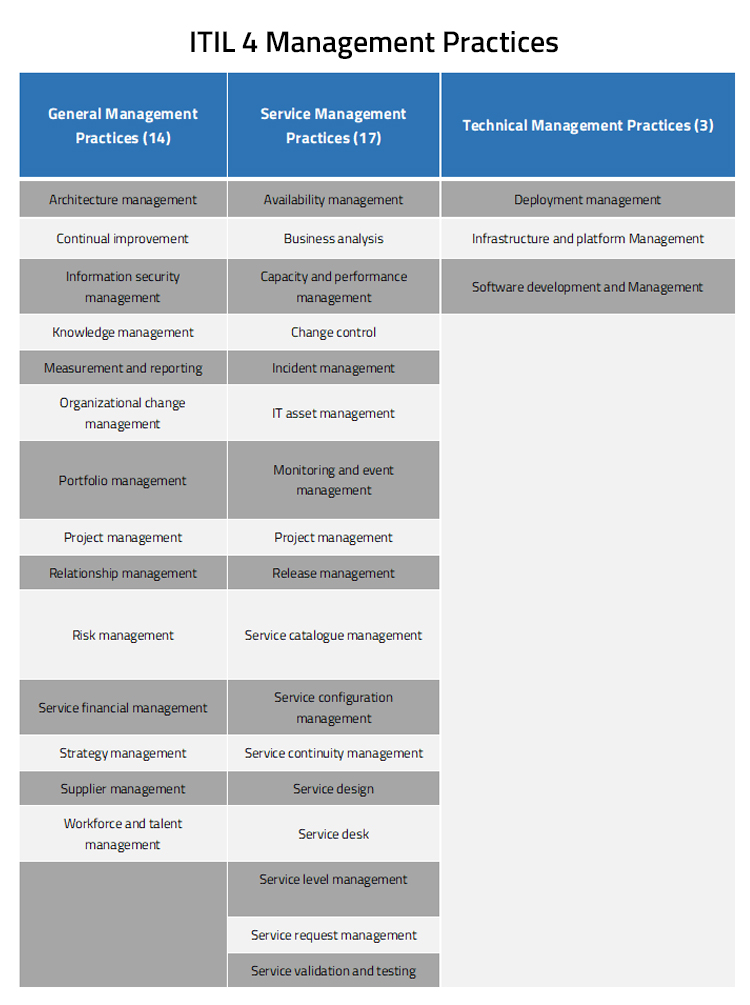
-
ITIL v3 Service Lifecycle is now the ITIL 4 Service Value System:
ITIL v3 lifecycle is based on the waterfall development model. It has five stages, namely:
- Service Strategy
- Service Design
- Service Transition
- Service Operations
- Continual Service Improvement
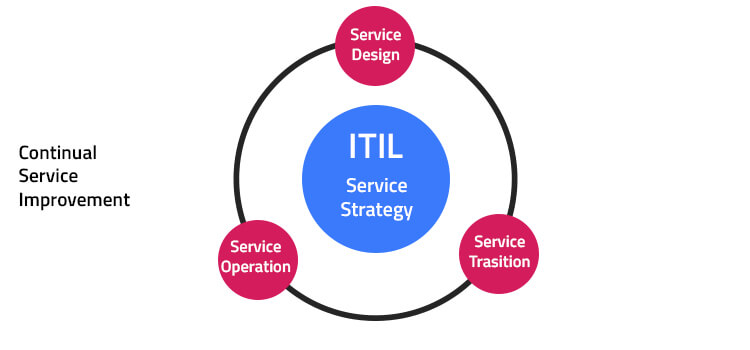 The core of ITIL 4 is the Service Value System (SVS). The service value system comprises six value chain activities that are interconnected and work together as a system to enable value creation. The six value chain activities are:
The core of ITIL 4 is the Service Value System (SVS). The service value system comprises six value chain activities that are interconnected and work together as a system to enable value creation. The six value chain activities are:- Plan
- Improve
- Engage
- Design and transition
- Obtain/build
- Deliver and support
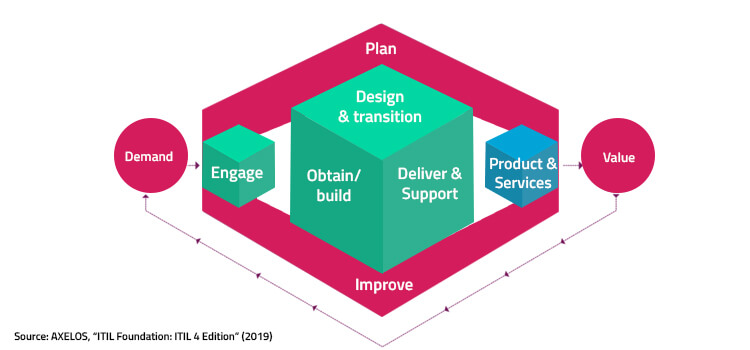
-
Guiding Principles:
ITIL v3 defined nine guiding principles, while ITIL 4 puts forth seven guiding principles. The continual service improvement (CSI) model of ITIL v3 is renamed to the Continual Improvement (CI) model post the update.
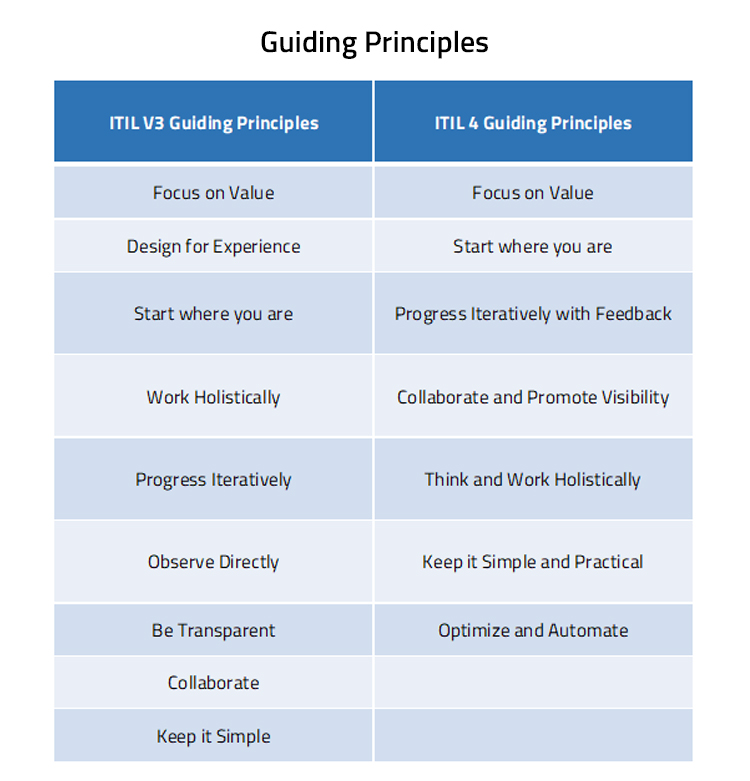
-
Four Ps to Four Dimensions:
The four Ps in the ITIL v3 framework are changed to four dimensions in ITIL 4.
alt=”Four Ps to Four Dimensions” />
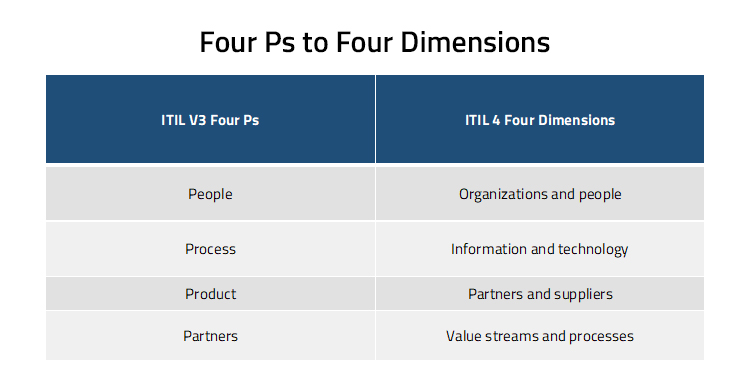
-
Aligning with DevOps:
ITIL 4 represents a paradigm shift from the waterfall model to the agile model. ITIL 4 aims to set a more consistent tone with evolving technologies. For this, ITIL 4 aligns with DevOps and Agile. It enables organizations to foster improved relationships with customers and stakeholders and create a dynamic IT environment encouraging growth. Compared to its previous versions, ITIL 4 creates a supportive environment and brings IT to another level of efficiency by aligning with DevOps, Lean, and Agile.
-
ITIL v3 vs.
ITIL V4 Certifications: In the table below, you can see the changes in the certification roadmap of ITIL 4 compared to ITIL v3.
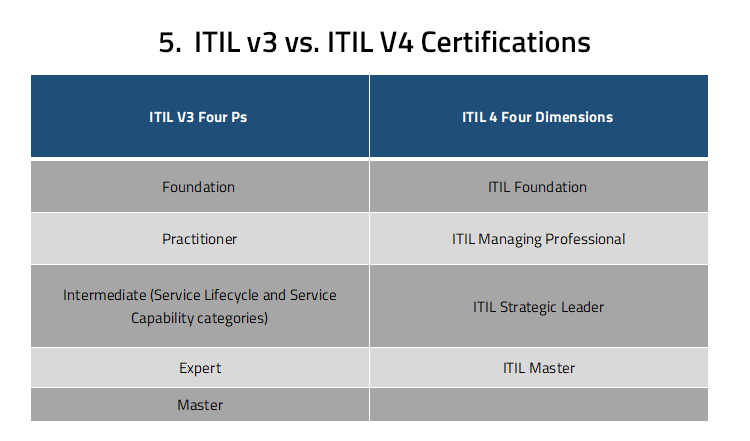
Emphasis on Automation and AI: ITIL 4 emphasizes on automation and AI in the field of ITSM. The ITIL foundation book builds on the nine guiding principles calling for “optimize and automate”. This principle is described as:
“Resources of all types, particularly human resources (HR), should be used to their best effect. Eliminate anything that is truly wasteful and use technology to achieve whatever it is capable of achieving. Human intervention should only happen where it contributes value.”
Source: AXELOS, “ITIL Foundation, ITIL 4 edition” (2019)
One of the key areas of the shift in the overall framework for ITIL 4 is the philosophical change from service-focused to value-focused. This shift has made ITIL 4 a much-needed framework. The focus on co-creation takes ITIL 4 out of the technology textbook and places it right next to practical business needs. All in all, the latest in the ITIL series has evolved the framework to work better and integrate well with the modern world by following a less- siloed approach.
Cognixia – world’s leading digital talent transformation company is offering a fully developed portfolio of AXELOS accredited formal classes, ranging from the foundation to intermediate and expert levels. Our ITIL 4 training focuses on helping organizations and individuals understand ITIL best practices and ultimately achieve the ITIL certifications. The more advanced courses take a deeper and more detailed approach to ITIL best practices, helping candidates prepare for the most challenging roles within IT organizations. To know more about our ITIL4 Certification Training course.

